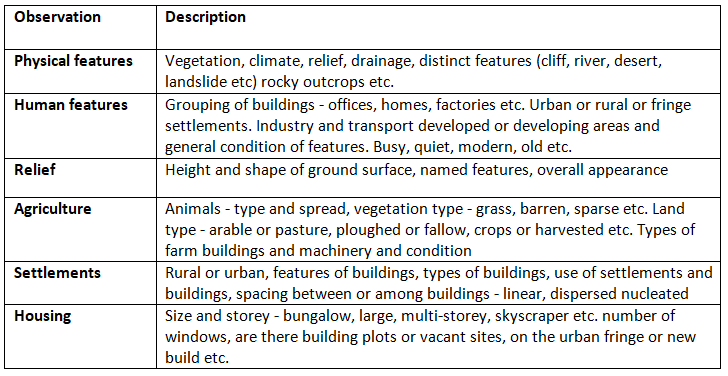Year 11 Exam > Year 11 Notes > Geography for GCSE/IGCSE > Photographs & Pictorial Material
Photographs & Pictorial Material | Geography for GCSE/IGCSE - Year 11 PDF Download
Photographs & Pictorial Material
- "Describe" is typically the instruction used for photographs.
- This focuses on honing observational abilities and comprehending the contents of the image.
- When describing, it's important to pay attention to:

Field Sketches
- Should include location/site number, title, and compass direction
- Includes the key features at a site:

- In geography exams, students may be required to sketch and label key features from photographs.
- Precision in artistry is not the focus; however, identifying crucial elements like rivers, coastlines, and hills is essential.
- Adhere to geographical sketching guidelines:
- Begin by framing your sketch with a box.
- Always use a pencil for drawing.
- Utilize colors to emphasize specific features.
- Employ a ruler for creating straight lines and arrows.
- Direct arrows towards the feature, not the label.
- Avoid crossing arrow lines.
- Write labels horizontally next to the arrow using a pen.
Question for Photographs & Pictorial MaterialTry yourself: What is the purpose of sketching key features from photographs in geography exams?View Solution
The document Photographs & Pictorial Material | Geography for GCSE/IGCSE - Year 11 is a part of the Year 11 Course Geography for GCSE/IGCSE.
All you need of Year 11 at this link: Year 11
|
57 videos|70 docs|80 tests
|
FAQs on Photographs & Pictorial Material - Geography for GCSE/IGCSE - Year 11
| 1. What is the importance of field sketches in documenting scientific research? |  |
Ans. Field sketches play a crucial role in capturing the details of a site or specimen that may not be easily conveyed through photographs. They provide a visual record that can aid in accurate documentation and analysis of the natural world.
| 2. How can photographs be used to supplement field sketches in scientific research? |  |
Ans. Photographs can provide additional details and perspectives that may not be captured in field sketches. They can also serve as a reference for further analysis and comparison, enhancing the overall documentation process.
| 3. What are some best practices for capturing high-quality photographs in the field? |  |
Ans. To capture high-quality photographs in the field, it is important to pay attention to lighting, framing, and focus. Using a good camera with appropriate settings and techniques can help ensure clear and detailed images.
| 4. How can field sketches and photographs be used in conjunction with each other to enhance scientific research outcomes? |  |
Ans. By combining field sketches and photographs, researchers can create a comprehensive visual record that captures both the fine details of sketches and the realistic representation of photographs. This can lead to a more thorough and accurate analysis of the subject matter.
| 5. What are some common challenges faced when using field sketches and photographs in scientific research, and how can they be overcome? |  |
Ans. Common challenges include issues with lighting, accuracy, and the time-consuming nature of creating detailed sketches. These challenges can be overcome by using proper equipment, techniques, and practices to ensure that the documentation is as accurate and informative as possible.
Related Searches


















